
Pursuing agroecology in hunger hotspot countries is not only a viable strategy for improving food security, but an effective means of promoting water conservation.
1. Sustainable water management
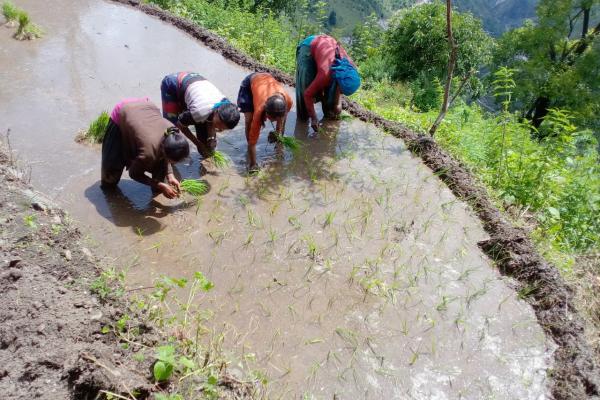
Agroecology emphasises sustainable farming practices that prioritise the efficient use of natural resources, including water.1 In hunger hotspot countries, where water resources are often scarce and threatened by climate change, adopting agroecological approaches can help optimise water usage in agriculture.
Techniques such as rainwater harvesting, integrated crop-livestock systems, and agroforestry can enhance water retention and reduce wastage.2
Women in the Humla district in Nepal have adopted the use of the System of Rice Intensification (SRI) method. SRI is a holistic approach to sustainable rice cultivation. By minimising water use and alternating wet and dry conditions, it minimises methane production and emissions.
Supported by VSO volunteer and permaculture expert, Chris Evans, the women have been trained to plant single rice seedlings at a young (2-leaf) stage, using wider spacing and less flooding than conventional methods, resulting in better root growth.
2. Soil health and water retention
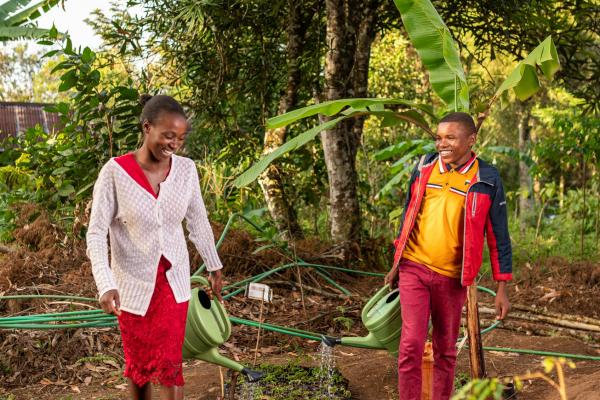
Agroecological practices, such as cover cropping and crop rotation, enhance soil health.3 Healthy soils can retain moisture better, reducing the need for excessive irrigation in regions prone to drought.4 By improving soil structure and organic matter content, agroecology contributes to enhanced water infiltration and retention.
Youth champions like Kenyan volunteer, Fridah Okomo, are helping to strengthen community resilience to the effects of global warming and improve soil quality by training local people in organic farming methods.
She’s taught people in her community about the benefit of working alongside nature, by cultivating and planting resilient crops that don’t require the use of harmful pesticides.
I refuse to accept that we are victims of climate change. I know that, together, we can provide the solutions people need” says Fridah.
3. Reduced dependency on irrigation
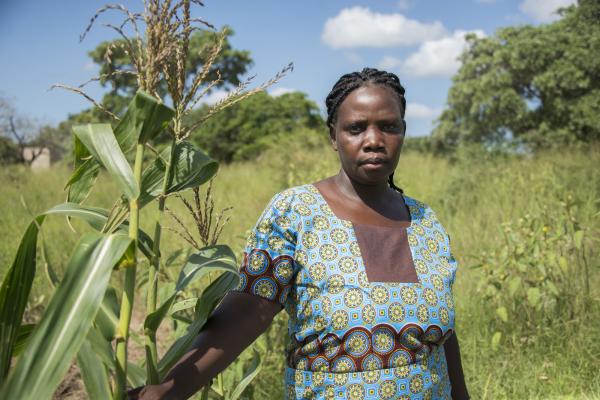
Many hunger hotspot countries heavily rely on irrigation, which can strain already limited water resources. Agroecology promotes drought-resistant crop varieties and farming systems that require less irrigation. This reduces the burden on local water sources, making them more sustainable and accessible for both agriculture and drinking water.5
4. Biodiversity and ecosystem services
Agroecology encourages the cultivation of diverse crops and the preservation of natural habitats within agricultural landscapes.
These practices support pollinators and beneficial organisms, which in turn contribute to more efficient water use through improved ecosystem services.6 Healthy ecosystems can help regulate water flows and maintain water quality.
In Mozambique, VSO has linked farmers with the National Gene bank, which supports knowledge and skills transfer on seed storage, seed conservation and supporting withdrawal of lost seeds from the national gene bank.
This helps to ensure the long-term conservation of Mozambique’s diverse and valuable plants and produce a wide diversity of food which is essential for proper nutrition, as well as supporting research to improve species conservation and habitat restoration.
5. Resilience to climate change
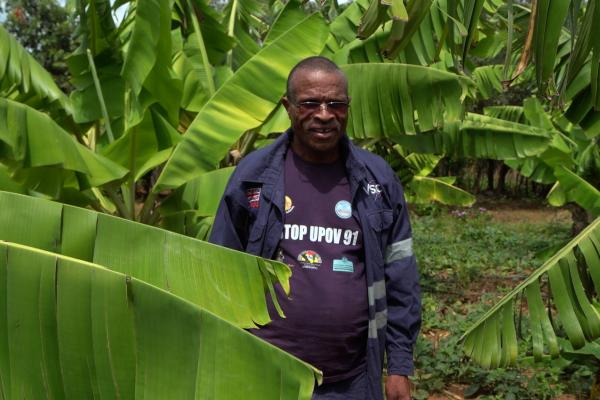
Hunger hotspot countries are often vulnerable to climate change impacts, including erratic rainfall patterns.
Agroecological approaches are inherently adaptive and resilient, as they diversify farming systems and reduce reliance on single crops that may be sensitive to climate variability.7 This adaptability helps communities cope with changing water availability.
Nelson Mudzingwa is the National Coordinator for VSO's partner, Zimbabwe Small-Holder Organic Farmers Forum (ZIMSOFF), which is a centre of excellence in agroecology.
Funded by the UK governments ACTIVE programme, the project is supporting agroecology work and the role of farmer associations in improving food sovereignty and helping people to access to healthy food, produced through ecologically sound and sustainable methods.
“Sometimes as farmers we are not able to cope. The volunteers have come with a lot of counselling because we are not coping with climate change. They come in as a bridging gap for us to develop resilience." says Nelson.
“Climate change has pushed more farmers to start harvesting water. This is a very dry area. When it’s a good season, we get just 400ml. We are showing evidence that this method of food production that is based on utilisation of local resources is very possible, even when you are in a very dry land area.”
6. Social and economic benefits
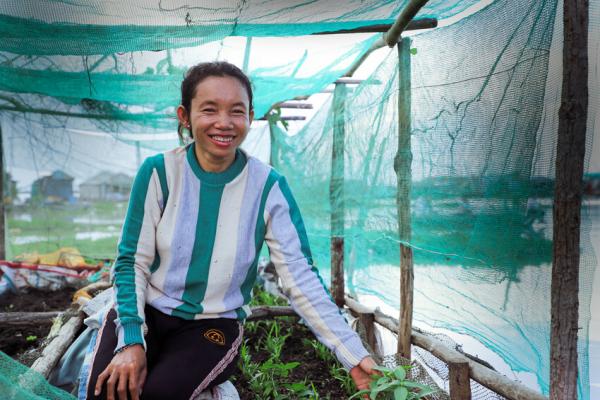
Agroecology can also lead to improved livelihoods and reduced poverty in hunger hotspot regions.8 As communities adopt sustainable farming practices, they become less dependent on expensive inputs like synthetic fertilizers and pesticides, which can be water intensive.
This reduction in input costs can free up resources for investments in water infrastructure and conservation projects.9 10
Agroecology is more than a set of techniques. It is also a movement of smallholder food producers. It emphasises local economies and food systems which means shorter supply chains, making food systems more robust against extreme climate change-fuelled weather and other shocks, such as the instability we’ve witnessed due to the war in Ukraine.
Pursuing agroecology in hunger hotspot countries not only addresses food security but also contributes significantly to water conservation efforts.
By promoting sustainable agricultural practices that enhance water efficiency, improve soil health, and reduce reliance on irrigation, agroecology offers a holistic solution to the intertwined challenges of hunger and water scarcity in vulnerable regions.
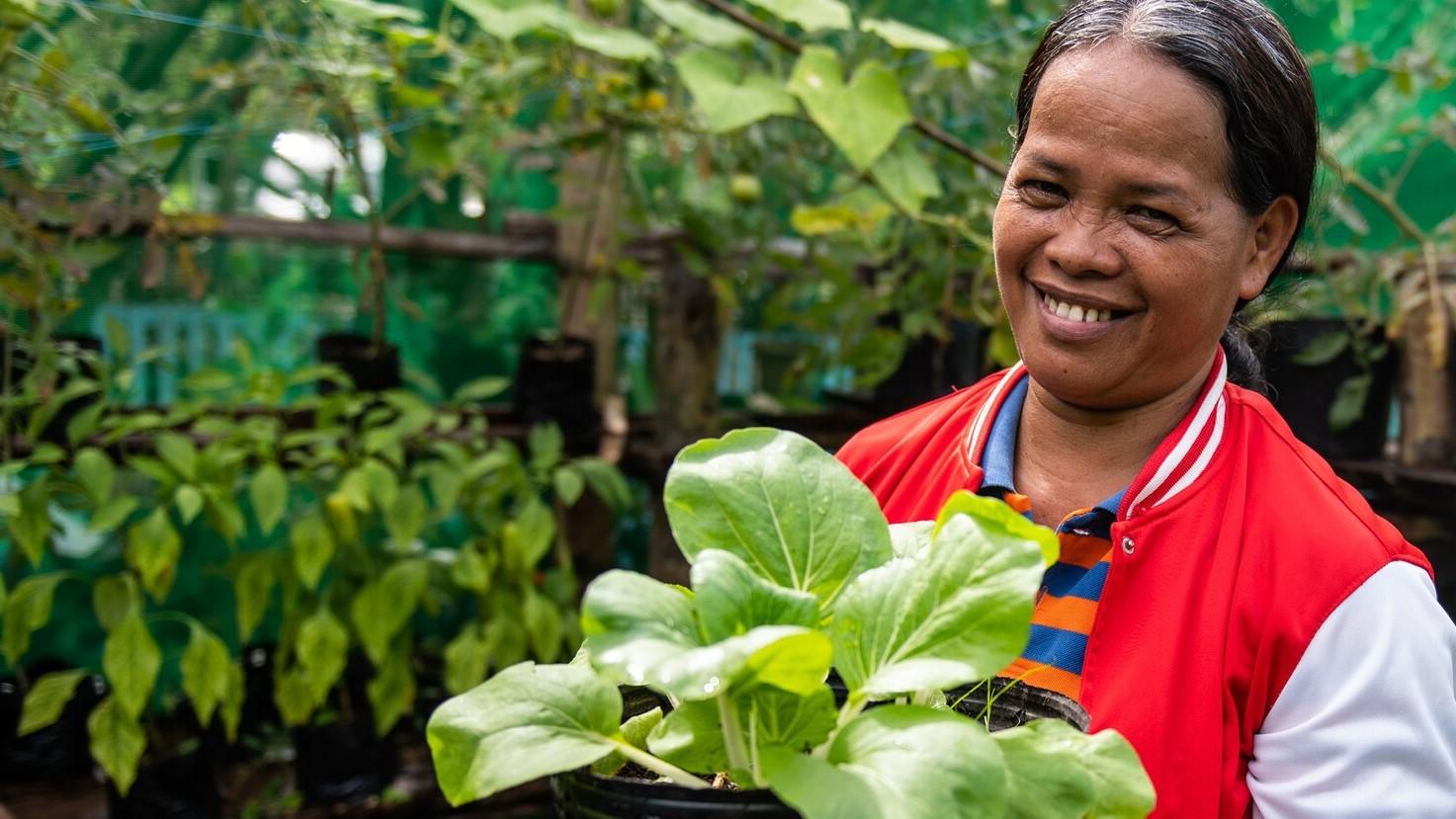
Support us with a donation
Footnotes

- Altieri, M. A. (2002). Agroecology: the science of natural resource management for poor farmers in marginal environments. Agriculture, Ecosystems & Environment, 93(1-3), 1-24.
- Rockström, J., & Falkenmark, M. (2015). Agriculture: Increase water harvesting in Africa. Nature, 519(7544), 283-285.
- Gliessman, S. R. (2014). Agroecology: the ecology of sustainable food systems. CRC Press.
- Pretty, J. (2008). Agricultural sustainability: concepts, principles, and evidence. Philosophical Transactions of the Royal Society B: Biological Sciences, 363(1491), 447-465.
- Mekonnen, M. M., & Hoekstra, A. Y. (2012). A global assessment of the water footprint of farm animal products. Ecosystems, 15(3), 401-415.
- Altieri, M. A. (2002).
- Pretty, J. (2008).
- FAO (Food and Agriculture Organization). (2019). Save and Grow: Maize, Rice, and Wheat.
- Altieri, M. A. (2002).
- Gliessman, S. R. (2014).
Read more

Transforming lives through education: Geoffrey’s VSO legacy
With a deep belief in the transformative power of education, Geoffrey from Norfolk, UK, has devoted his life both in the UK and abroad to making education more accessible for all.

The two volunteers empowering girls and young women in Mozambique
Nelma and Carmirene and are two volunteers working on VSO's EAGLE project in Mozambique. For Nelma and Carmirene, education is not just about school, it is about meeting people where they are and using the right tools to challenging harmful norms. Here are their stories.
